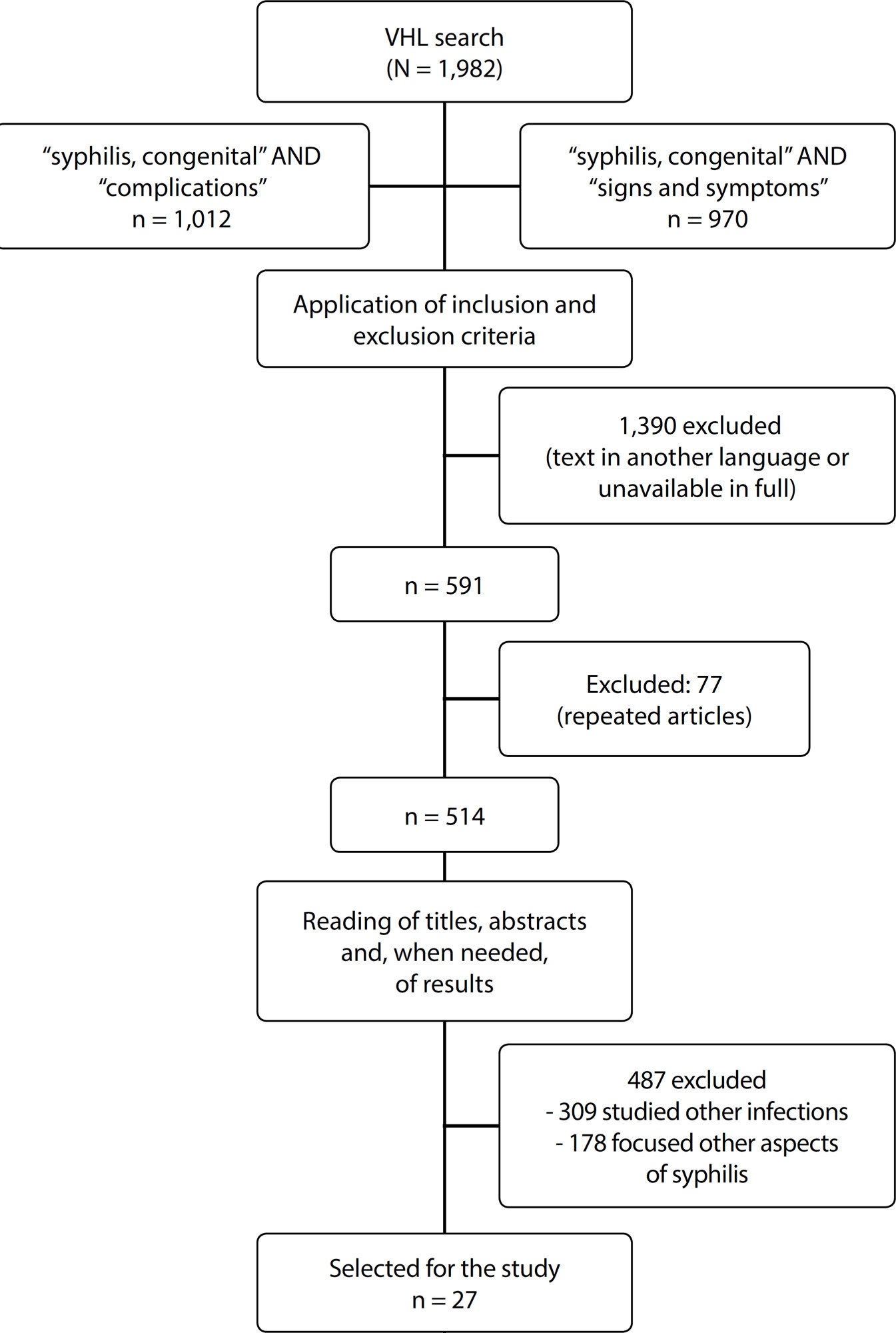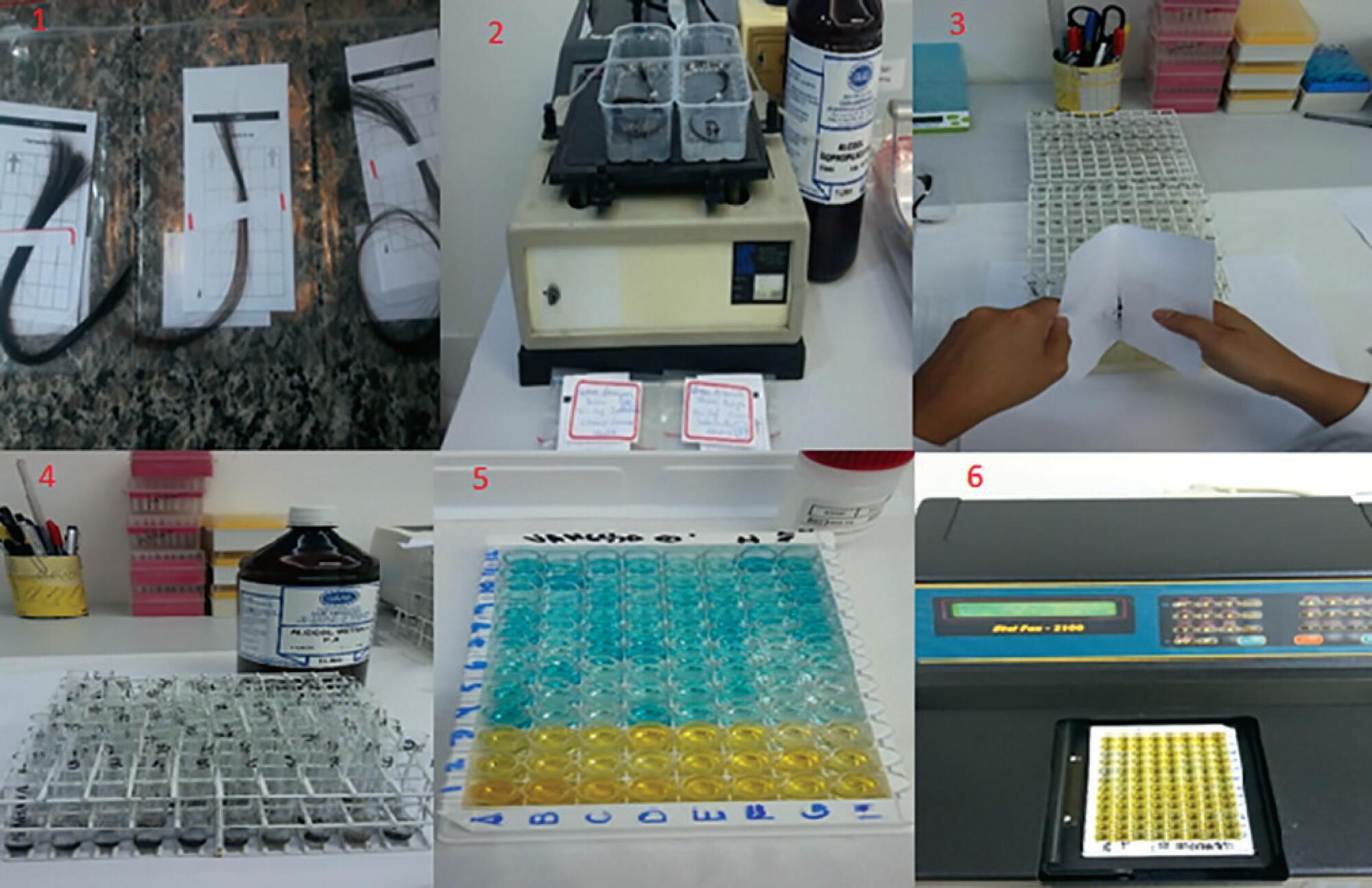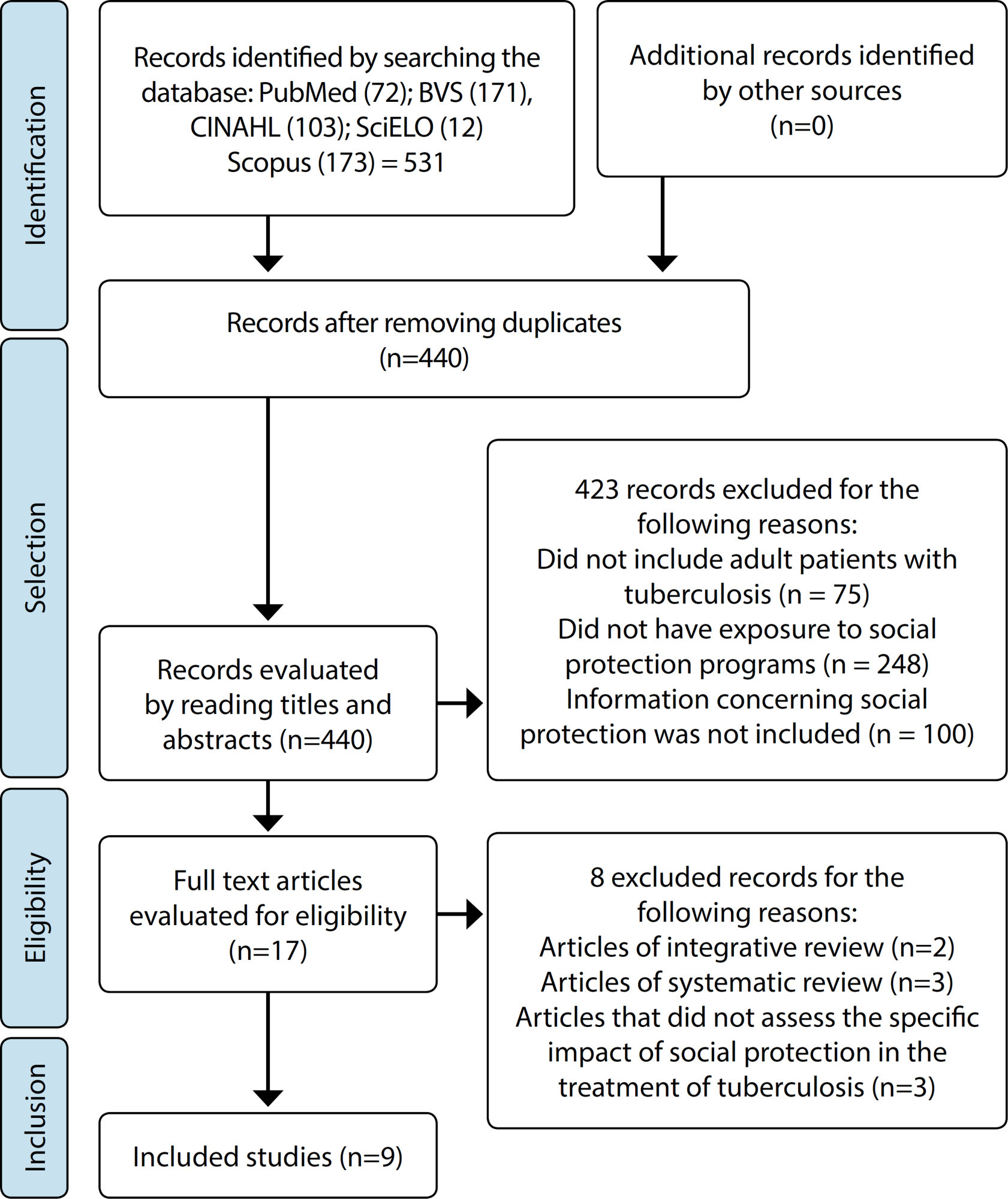-
ORIGINAL ARTICLE
Factors associated with COVID-19 death in pregnant women hospitalized in Intensive Care Units
Revista Brasileira de Enfermagem. 2024;77(5):e20230172
08-26-2024
Abstract
ORIGINAL ARTICLEFactors associated with COVID-19 death in pregnant women hospitalized in Intensive Care Units
Revista Brasileira de Enfermagem. 2024;77(5):e20230172
08-26-2024DOI 10.1590/0034-7167-2023-0172
Views0ABSTRACT
Objectives:
to evaluate the factors associated with COVID-19 death in pregnant women hospitalized in Intensive Care Units in Brazil.
Methods:
this ecological study was conducted using secondary data from Brazilian pregnant women with COVID-19 hospitalized in Intensive Care Units between March 2020 and March 2022. Univariate analysis and logistic regression were employed.
Results:
out of 3,547 pregnant women with COVID-19 hospitalized in Intensive Care Units, 811 died (22.8%). It was found that lack of COVID-19 vaccination (OR: 2.73; 95% CI: 1.83; 4.04), dyspnea (OR: 1.73; 95% CI: 1.17; 2.56), obesity (OR: 1.51; 95% CI: 1.05; 2.17), chronic cardiovascular disease (OR: 1.65; 95% CI: 1.14; 2.38), and non-white race/color (OR: 1.29; 95% CI: 1.00; 1.66) were independently and significantly associated with death.
Conclusions:
it is concluded that vaccination status, presence of comorbidities, and clinical and ethnic-racial characteristics are associated with COVID-19 death in pregnant women hospitalized in Intensive Care Units in Brazil.
Keywords:COVID-19Intensive Care UnitMaternal MortalityPregnant WomenSevere Acute Respiratory SyndromeSee more -
ORIGINAL ARTICLE
Influence of the leukoreduction moment of blood components on the clinical outcomes of transfused patients in the emergency department
Revista Brasileira de Enfermagem. 2024;77(5):e20230293
08-26-2024
Abstract
ORIGINAL ARTICLEInfluence of the leukoreduction moment of blood components on the clinical outcomes of transfused patients in the emergency department
Revista Brasileira de Enfermagem. 2024;77(5):e20230293
08-26-2024DOI 10.1590/0034-7167-2023-0293
Views0ABSTRACT
Objectives:
to investigate the influence of the leukoreduction moment (preor post-storage) of blood components on the clinical outcomes of patients transfused in the emergency department.
Methods:
retrospective cohort study of patients aged 18 years or older who received preor post-storage leukoreduced red blood cell or platelet concentrate in the emergency department and remained in the institution for more than 24 hours. A generalized mixed-effects model was applied in the analyses.
Results:
in a sample of 373 patients (63.27% male, mean age 54.83) and 643 transfusions (69.98% red blood cell), it was identified that the leukoreduction moment influenced the length of hospital stay (p<0.009), but was not dependent on the transfused blood component (p=0.124). The leukoreduction moment had no effect (p>0.050) on transfusion reactions, healthcare-associated infections, or mortality.
Conclusions:
patients who received pre-storage leukoreduced blood components in the emergency department had a shorter length of hospital stay.
Keywords:Blood TransfusionClinical EvolutionEmergency Medical ServiceLeukocyte Reduction ProceduresTransfusion ReactionSee more
-
ORIGINAL ARTICLE
Leadership styles and personal values of professors at a school of nursing
Revista Brasileira de Enfermagem. 2024;77(5):e20230333
08-26-2024
Abstract
ORIGINAL ARTICLELeadership styles and personal values of professors at a school of nursing
Revista Brasileira de Enfermagem. 2024;77(5):e20230333
08-26-2024DOI 10.1590/0034-7167-2023-0333
Views0See moreABSTRACT
Objectives:
to identify professors’ leadership styles and personal values.
Methods:
a quantitative, descriptive-exploratory study. Population was made up of professors in doctoral category 1 at a public university in the state of São Paulo. Data collection took place from June to August 2021. Sociodemographic characterization was extracted, and the Leadership Team Values Assessment was applied. Data were analyzed using measures of central tendency.
Results:
population included 13 professors. The level that represents authentic leadership was the most prevalent. The commitment, positive attitude and trust values stood out. The level portrayed by visionary leadership was the least identified.
Conclusions:
professors’ personal values provide a theoretical basis for guiding and analyzing professors’ leadership styles. Leadership in the educational context must be recognized and studied to promote a more comprehensive and effective approach to developing and improving educational leaders.

-
EDITORIAL
Sexual abuse, abortion and public health in Brazil: when moral judgment accentuates inequities
Revista Brasileira de Enfermagem. 2024;77:e77suppl0401
08-19-2024
Abstract
EDITORIALSexual abuse, abortion and public health in Brazil: when moral judgment accentuates inequities
Revista Brasileira de Enfermagem. 2024;77:e77suppl0401
08-19-2024DOI 10.1590/0034-7167.202477suppl0401
Views0Here is an academic-political editorial that aims to call on the scientific field to reflect on the dangers of decisions regarding the right to abortion under moral rules, since there is no evidence that such a perspective translates into practices of care, protection of childhood and gender equity – elements that are so urgent and […]See more -
ORIGINAL ARTICLE
Bioethical issues in the family health strategy: Considerations for nursing care management
Revista Brasileira de Enfermagem. 2024;77:e20220818
08-19-2024
Abstract
ORIGINAL ARTICLEBioethical issues in the family health strategy: Considerations for nursing care management
Revista Brasileira de Enfermagem. 2024;77:e20220818
08-19-2024DOI 10.1590/0034-7167-2022-0818
Views0See moreABSTRACT
Objective:
To understand the bioethical issues involved in the care management of nurses working in the Family Health Strategy.
Method:
A qualitative study was conducted through five focus groups with 36 nurses selected in the sample. Thematic content analysis was performed based on the bioethical framework, and the synthesis was presented in a conceptual map.
Results:
Bioethical issues were identified in the nursing care practice, related to both specific bioethical themes and the peculiarities of the work. Additionally, challenges and facilitators that interfere with addressing these issues were identified.
Final considerations:
Understanding the bioethical issues involved in the care management of nurses was possible with the theoretical support of different bioethical perspectives. The identified issues relate to persistent and current themes in the field of bioethics. However, some aspects intrinsic to daily practice are still imperceptible to professionals, contributing to the difficulty of discussing bioethics in this care model.

-
ORIGINAL ARTICLE
The use of individual tracking programs in public health: a bioethics dilemma
Revista Brasileira de Enfermagem. 2024;77:e20230041
08-19-2024
Abstract
ORIGINAL ARTICLEThe use of individual tracking programs in public health: a bioethics dilemma
Revista Brasileira de Enfermagem. 2024;77:e20230041
08-19-2024DOI 10.1590/0034-7167-2023-0041
Views0See moreABSTRACT
Objective:
to understand the bioethical perspectives on mobile tracking device use.
Methods:
theoretical study based on action research, carried out with eight graduate students from a public university. A focus group was used, with a thematic content analysis methodology with a codebook structure, approved by the Research Ethics Committee.
Results:
from the analysis, there was a concern about using devices after the pandemic ended. Using or not the device, rights inherent to humans, legislation and effectiveness of methods deepen interpretations, moving participants from a personalistic conception of the topic to a vision focused on professional implications about the methods.
Final considerations:
the debate on the impact of using technological devices on health, especially those that imply restriction of rights that refer to individuals’ private life, involves a discussion of a professional nature, in addition to requirement for clear rules on the topic.
-
EDITORIAL
Abuso sexual, aborto e saúde pública no brasil: quando o julgamento moral acentua as iniquidades
Revista Brasileira de Enfermagem. 2024;77:e77suppl0401
08-19-2024
Abstract
EDITORIALAbuso sexual, aborto e saúde pública no brasil: quando o julgamento moral acentua as iniquidades
Revista Brasileira de Enfermagem. 2024;77:e77suppl0401
08-19-2024DOI 10.1590/0034-7167.202477suppl0401pt
Views0Eis aqui um editorial acadêmico-político que tem como objetivo convocar o campo científico a refletir sobre os perigos das decisões relativas ao direito ao aborto sob réguas morais, uma vez que não há evidências de que tal perspectiva se traduza em práticas de cuidado, proteção à infância e equidade de gênero – elementos tão urgentes […]See more -
ORIGINAL ARTICLE
Mental health of parents of children and adolescents who require special health care
Revista Brasileira de Enfermagem. 2024;77(3):e20230457
07-29-2024
Abstract
ORIGINAL ARTICLEMental health of parents of children and adolescents who require special health care
Revista Brasileira de Enfermagem. 2024;77(3):e20230457
07-29-2024DOI 10.1590/0034-7167-2023-0457
Views0See moreABSTRACT
Objective:
To identify the manifestations presented by parents of children and adolescents who require special health attention that can impact their mental health.
Methods:
exploratory, qualitative research, based on the concept of vulnerability, with data collection carried out through interviews with 18 parents of children and adolescents with special health care needs, hospitalized in the pediatric ward of a hospital in Paraná, between May/2017 and May/ 2018. Data analyzed by inductive thematic analysis.
Results:
parents experienced situations of vulnerability when providing care at home, with repercussions on their mental health, expressed by manifestations of lack of protection, anxiety and depression.
Final considerations:
It is important that health professionals seek to expand actions to promote care and reduce situations that generate threats, insecurities, concerns and damage to the health of parents, which can impact and further weaken care for children and adolescents who need attention especially health.
-
REVIEW
Complications, clinical manifestations of congenital syphilis, and aspects related to its prevention: an integrative review
Revista Brasileira de Enfermagem. 2021;74(4):e20190318
07-14-2021
Abstract
REVIEWComplications, clinical manifestations of congenital syphilis, and aspects related to its prevention: an integrative review
Revista Brasileira de Enfermagem. 2021;74(4):e20190318
07-14-2021DOI 10.1590/0034-7167-2019-0318
Views0See moreABSTRACT
Objectives:
to identify the scientific evidence about the clinical complications and manifestations of congenital syphilis and aspects related to its prevention.
Methods:
integrative review after a search in the databases LILACS and MEDLINE, carried out in March 2018, using the descriptors “syphilis, congenital”, “complications”, and “signs and symptoms”, leading to the selection of 27 researches.
Results:
the publications found were published from 1966 to 2017, and most of them were from Latin America and Africa. Negative outcomes, laboratory changes, and the clinical manifestations in congenital syphilis, whether early or delayed, were, respectively: low weight at birth, anemia, hepatosplenomegaly, and dental alterations. The lack of treatment of the pregnant women in the prenatal was the most common occasion in which the opportunity to prevent the complications of congenital syphilis was lost.
Conclusions:
the scientific evidences analyzed showed serious complications of congenital syphilis that could be avoided if early opportunities of diagnosing and treating the pregnant women are not lost during the prenatal.

-
ORIGINAL ARTICLE
Cultural adaptation of Infant Feeding Intentions Scale (IFI) for pregnant women in Brazil
Revista Brasileira de Enfermagem. 2020;73:e20190103
07-15-2020
Abstract
ORIGINAL ARTICLECultural adaptation of Infant Feeding Intentions Scale (IFI) for pregnant women in Brazil
Revista Brasileira de Enfermagem. 2020;73:e20190103
07-15-2020DOI 10.1590/0034-7167-2019-0103
Views0See moreABSTRACT
Objectives:
to translate and culturally adapt the Infant Feeding Intentions Scale for pregnant women in Brazil.
Methods:
methodological study that included stages of translation, synthesis, face and content validation, back translation and semantic assessment. In the face and content and semantic validation stages, we used the Content Validity Index for individual items and for the overall scale for clarity and representativeness.
Results:
nine (100.0%) experts participated in face and content validation, and the average index obtained was 85.0% for representativeness. In the semantic assessment, performed with 31 (100.0%) pregnant women, the tool was considered clear, obtaining an average index of 91.0%.
Conclusions:
the Brazilian version of the scale was considered representative and clear. After assessing psychometric properties, the scale is expected to be valid and reliable to assess maternal intention to breastfeed exclusively until the infant’s six months of life in different Brazilian settings.
-
ORIGINAL ARTICLE
Development, validation and application of clinical simulation scenarios for assessment of stomatherapy specialists
Revista Brasileira de Enfermagem. 2021;74(1):e20200360
03-24-2021
Abstract
ORIGINAL ARTICLEDevelopment, validation and application of clinical simulation scenarios for assessment of stomatherapy specialists
Revista Brasileira de Enfermagem. 2021;74(1):e20200360
03-24-2021DOI 10.1590/0034-7167-2020-0360
Views0ABSTRACT
Objectives:
to build and validate three clinical simulation scenarios and report the application with candidates for the specialist’s degree in stomatherapy.
Methods:
methodological study, building three scenarios and evaluation checklists; content validation with judges, using content validity index and Modified Kappa Coefficient; pre-test and application.
Results:
scenarios built based on nursing care for: 1. insufficiency and venous ulcer; 2. demarcation of intestinal stomia; and 3. Clean intermittent catheterization. In the content validation of the 24 items appreciated, 83%, 80%, and 92% were validated without change. In the pre-test, the objectives and checklists were adjusted. In the application, to standardize the evaluation, actors and evaluators were trained previously, and each candidate passed the three stations.
Conclusions:
scenarios built and with validated content, based on evidence and covering the three areas of stomatherapy. The pre-test allowed for adjustments in the scenarios, and the candidates achieved the expected objectives.
Keywords:Educational AssessmentNursing EducationPatient SimulationSimulation TrainingValidation StudiesSee more -
ORIGINAL ARTICLE
Management of home care by family caregivers to elderly after hospital discharge
Revista Brasileira de Enfermagem. 2020;73:e20200474
12-07-2020
Abstract
ORIGINAL ARTICLEManagement of home care by family caregivers to elderly after hospital discharge
Revista Brasileira de Enfermagem. 2020;73:e20200474
12-07-2020DOI 10.1590/0034-7167-2020-0474
Views0See moreABSTRACT
Objective:
To understand the management of home care by family caregivers of dependent elderly people after hospital discharge.
Methods:
Qualitative research guided by hermeneutics-dialectic, anchored in the theory of communicative action. Data collection took place using a semi-structured interview with 11 participants.
Results:
Two categories were constructed: Management of the many types of care by the caregiver and the relationship between family caregiver and health care network. Care and management actions carried out routinely cause major changes in the family caregiver’s life. He/she does not recognize planning, home care periodicity or support in required procedures.
Final Considerations:
The management of home care for dependent elderly people after hospital discharge is complex, involving physical and emotional overloads, as well as difficulties in getting support from health services. The planning shared between the health team and the family since the discharge is required, and the better visibility of the role of primary care when the patient is assisted by a home care service.
-
Sexuality is associated with the quality of life of the elderly!
Revista Brasileira de Enfermagem. 2021;74:e20201272
07-09-2021
Abstract
Sexuality is associated with the quality of life of the elderly!
Revista Brasileira de Enfermagem. 2021;74:e20201272
07-09-2021DOI 10.1590/0034-7167-2020-1272
Views0See moreABSTRACT
Objective:
to analyze the association between sexuality and quality of life of Brazilian elderly residents in the community.
Methods:
a cross-sectional study conducted with 477 Brazilian elderly. The data were collected between August and October 2020. We used the EVASI and WHOQOL-OLD (World Health Organization Quality of Life). Data analysis was performed with Mann-Whitney, Spearman and Kruskal-Wallis correlation tests, with Bonferroni post-hoc application when necessary, considering a 95% confidence interval.
Results:
there was a statistical association between all dimensions of sexuality and the general quality of life of the elderly (p<0.05).
Conclusion:
the stimulation of sexuality can be configured as an innovative and holistic strategy focused on the promotion of health and active aging, since this study found the association between sexuality and the general quality of life of elderly people.
-
ORIGINAL ARTICLE
Stress and cortisol levels among members of the nursing team
Revista Brasileira de Enfermagem. 2020;73:e20180953
06-01-2020
Abstract
ORIGINAL ARTICLEStress and cortisol levels among members of the nursing team
Revista Brasileira de Enfermagem. 2020;73:e20180953
06-01-2020DOI 10.1590/0034-7167-2018-0953
Views0See moreABSTRACT
Objective:
To analyze the characteristics of hospital nursing professionals with the presence of stress, and to associate this with capillary cortisol.
Method:
A cross-sectional, exploratory and correlational study, conducted in a hospital in São Paulo, Brazil. A total of 164 nursing professionals participated; the Perceived Stress Scale was administered, and hair samples were obtained for laboratory analysis. Data were entered into a Microsoft Excel spreadsheet (2010), and then into Microsoft Office and the R software, version 3.2.2.
Results:
High levels of capillary cortisol in 47% of participants suggest the presence of stress, but no statistical significance between cortisol and stress levels were found.
Conclusions:
Stress and capillary cortisol levels were indicative of stress among nursing professionals; however, no association between them was found, although the values found were above those recommended.

-
ORIGINAL ARTICLE
Functional health literacy in hypertensive elders at primary health care
Revista Brasileira de Enfermagem. 2019;72:266-273
12-05-2019
Abstract
ORIGINAL ARTICLEFunctional health literacy in hypertensive elders at primary health care
Revista Brasileira de Enfermagem. 2019;72:266-273
12-05-2019DOI 10.1590/0034-7167-2018-0897
Views0See moreABSTRACT
Objective:
to assess the relationship between inadequate functional health literacy and inadequate blood pressure control in older people with hypertension in Primary Health Care.
Method:
a cross-sectional study with sample calculated at 392. SAHLPA-18 tool was used for functional health literacy; blood pressure was measured; sociodemographic and clinical data were collected. Hierarchical logistic regression was used.
Results:
(high) inadequate blood pressure and (low) functional inadequate health literacy were present in 41.6% and 54.6% of the people, respectively. Factors associated with inadequate blood pressure were: inadequate functional health literacy, black-brown skin color, overweight-obesity, hypertension diagnosis time, non-adherence to exercise/diet, drug treatment. Schooling had no association with inadequate blood pressure
Conclusion:
hypertensive elderly people with inadequate health literacy were more likely to have inadequate blood pressure. Thus, health professionals need to value functional health literacy as a possible component to control blood pressure.
Search
Search in:
Nuvem de Tags
Aged (144) Atenção Primária à Saúde (239) COVID-19 (104) Cuidados de Enfermagem (269) Educação em Enfermagem (151) Educação em Saúde (139) Enfermagem (930) Estudos de Validação (131) Health Education (144) Idoso (208) Mental Health (149) Nursing (987) Nursing Care (306) Patient Safety (151) Primary Health Care (284) Qualidade de Vida (104) Quality of Life (106) Saúde Mental (145) Segurança do Paciente (150) Validation Studies (108)




